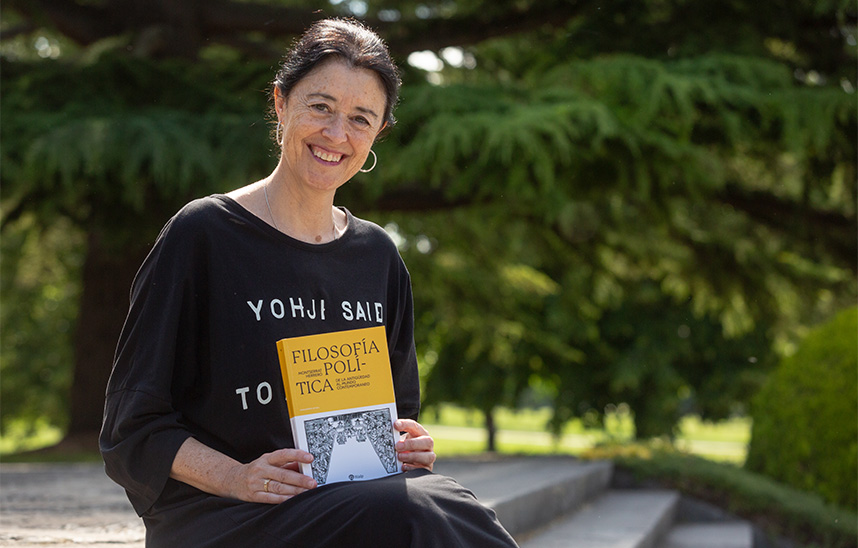"Thinking the reality of the political from a philosophical point of view we can get out of the current ideologization."
Professor Montserrat Herrero publishes the book "Philosophy Política. From Antiquity to the Contemporary World".

PhotoManuelCastells/
17 | 06 | 2024
Montserrat Herrero, professor of the School of Philosophy and Letters and principal investigator of the group Religion and Civil Society of the ICS, has taught the subject of Philosophy Politics for 30 years.
As a result of these decades of teaching, he has written "Philosophy Política. From antiquity to the contemporary world", a book in which he intends to make a genealogy of texts that have served as orientation to understand the political from antiquity, with Plato, to the contemporary world, with Ernesto Laclau.
Q. Why did you decide to write this book?
R. The book is a tribute to my students of subject Philosophy Politics for almost 30 years. It is a gift to my past, present and future students in the disciplines of Philosophy, Law, Communication, Medicine, PPE, who have been conquered by the subject.
It seems to me that a good university consists, fundamentally, of good professors, but for these to be forged it is necessary to have good students. I do not know if I have become the former, but I do know that I have had excellent students who today are in many important places in society and I have them very present every day in my work.
Q. What would you like to convey with this book?
R. It is the genealogy of the political reality of our time, in the parliamentary liberal democracies. Today it seems that only this way of understanding the organization of the political community is acceptable. This mode comes from traditions with wide differences and from concepts that have merged to give rise to what we understand today by a parliamentary liberal democracy. My subject is developed in a historical way, because I do not intend to offer a closed and dogmatic position, but to open a multiplicity of ways.
The book aims to help to make a critique of the present time, because only by thinking in depth about the reality of politics from a philosophical point of view can we get out of the ideologization of the contemporary world, which today we say is polarized in extreme ideologies. In this way we identify what is valid or what is most useful in the concepts with which these ideologies work. In final, this book can help a lot to reflect on the political beyond the political battles in which we are all involved and which are part of our daily life.
P. You have traversed these ideas through philosophers of all ages, from Plato to Laclau. How did you select these philosophers?
R. It has not been so complex because the decisions have been made over many years of teaching. The essay of the book took me about a year, but the ideas and the texts have been developing for 30 years. The most complicated thing has been to get rid of some texts or to leave out things that are known.
The book does not have a conclusion, it remains open. In general, people who have gone through my classroom are left with the question of what I think, and I like that because it means that I have not given them a product. The book is also open to everyone to draw their own conclusion. It seems to me that the philosophical attitude is the attitude of opening up questions and helping to reflect on the thinking of others and letting people come to their own conclusions.
P. If you could explain one concept from the book that you find curious, what would it be?
R. There is a chapter in the book dedicated to tyranny: sometimes we do not realize that this phenomenon is at the origin of the political phenomenon, because power always tends to grow. It seems to me that we have to be very attentive to this issue because, no matter how much we live in democracies, it is present.
Perhaps the chapter I can be most proud of is the one dedicated to Hegel's Philosophy of right because it is a very difficult book for students to read. However, it seems to me that I have made a synthesis that can help a lot. There are other topics that have come out almost by themselves, because I have written about their authors in other books, such as Hobbes or Spinoza.
Q. What are some concepts that have changed over time?
R. The very idea of democracy has undergone a great transformation. Athenian democracy is very different from modern democracy. The latter is understood as a government of the qualified majority. That is to say, what they say becomes the political truth and, therefore, it does not consider minorities. Now democracy has become an alliance of minorities.
Also the concept of freedom from Plato's Republic to Isaiah Berlin. These are ideas that are interesting to review their transformation.
P. You have commented that the book has no conclusions, but what conclusions have you drawn from writing this book?
R. The political panorama is always open and an adequate political coexistence must have clear and differentiated concepts. It seems to me that the great problem of the political world is the transformation of language into an ambiguous terrain, which is subsumed in the will to power. We have to reflect on the political having clear some ideas of reference letter, which try to be left aside to impose a power struggle.




